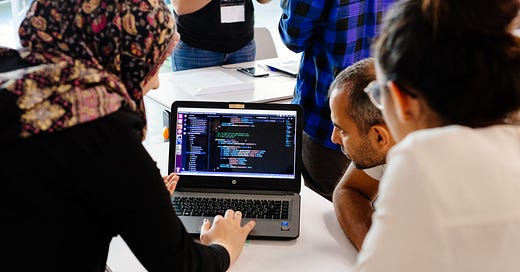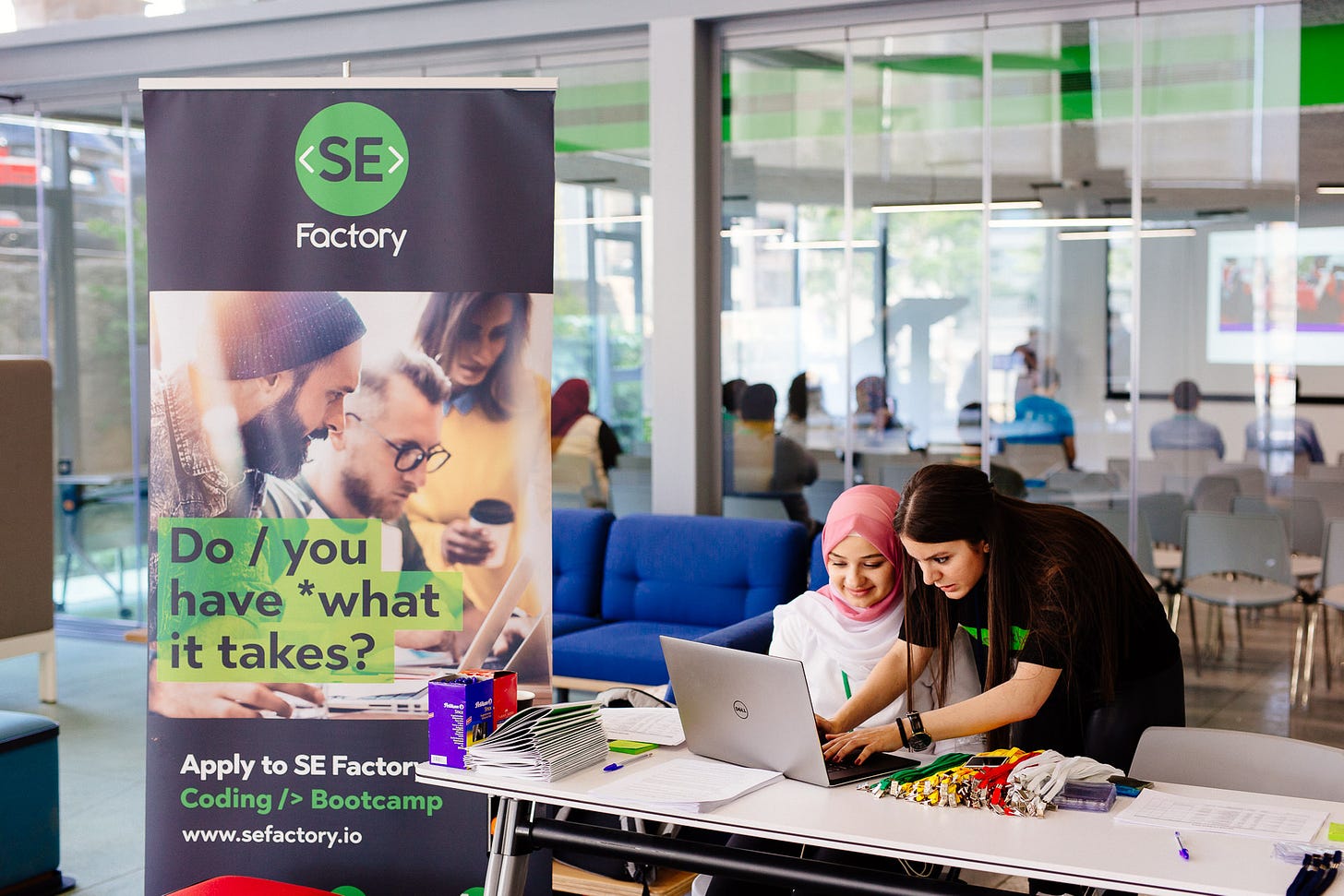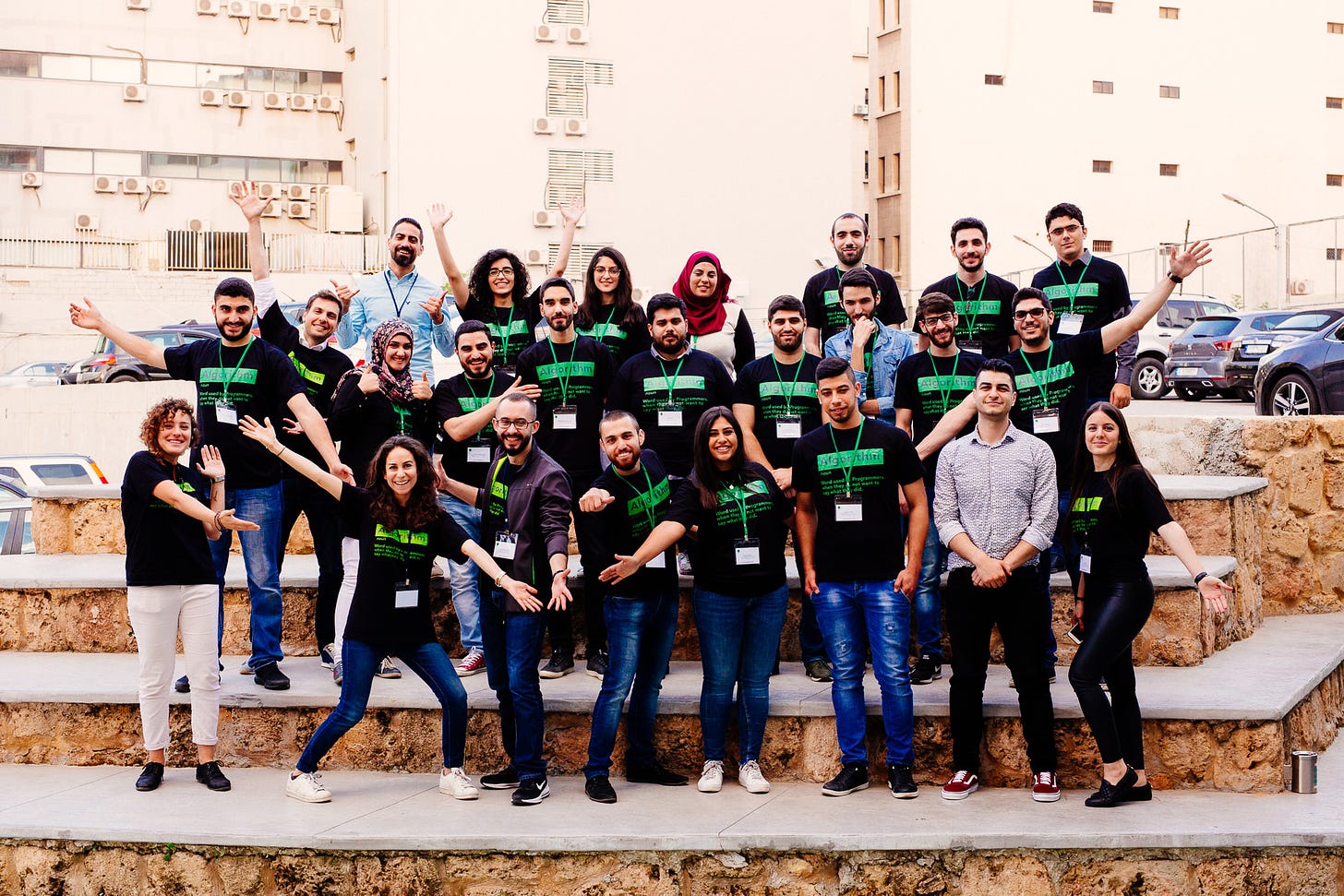The Code to Success: Lebanese Youth Retrain in Tech.
SE Factory runs coding bootcamps that give Lebanese students the skills they need to secure employment in the technology sector.
Finding a table in one of Beirut’s crowded cafes is difficult, finding one next to a plug socket is virtually impossible. The ongoing economic crisis that has gripped Lebanon since 2019 has exacerbated the country’s electricity problems, with power outages that last up to 22 hours a day in most regions. For many, cafes are now the only place they can study or work.
“A lot of our students couldn’t connect online at home so they had to go to cafes - but cafes across the country were overwhelmed with people trying to connect and charge their phones and laptops,” says Zeina Saab, co-founder of SE Factory, a social enterprise that teaches tech skills to unemployed youth. The organization has a dedicated workspace in Beirut Digital District, but few students can now afford the fuel to get there, she adds.
SE Factory runs coding bootcamps in Lebanon, with a focus on providing access to training for underprivileged youth. The organization has a 90 percent employment rate for students that complete the course, with one recent graduate securing a job at Microsoft on a salary of US $4,000 a month, but the situation in Lebanon is forcing many young people to reconsider their study plans.
Soaring food prices, scarce job opportunities and ongoing political deadlock present few prospects for Lebanese youth trying to carve out a future amid multiple crises. “First we had the revolution which, while a great step for our country, put our programs on hold for many weeks. Then it was Covid, economic collapse and the Beirut port blast with the political stagnation that followed,” says Saab.
But amid all of these setbacks, it was poor access to electricity that hindered SE Factory students from completing their course.
So when the team received an Innovation Hub grant from Ideas Beyond Borders, they used it to purchase 13 power banks, allowing students to work remotely around the country. “We offered them to students that needed them the most so they were able to work from home comfortably… If it weren’t for that support, they would have had to drop out,” Saab says.
The course is free but graduates are expected to pay a fee after they get hired while companies, says Saab, who launched SE Factory in 2016 with co-founder Fadi Bizri after identifying the need for qualified coders in Lebanon and globally, despite thousands of computer science students graduating in the country every year.
“The demand for coding is not going down, it’s critical for the way we function on a daily basis, everything requires this key skill, everything is technology based and that’s not going away,” she says.
“The current economic crisis may be devastating, but SE Factory embodies the spirit of Lebanese resilience. They are empowering both locals and refugees with the skill sets needed to survive in the modern global economy and possess the drive put Lebanon back on the map,” says Faisal Saeed Al Mutar, IBB's founder and president.
A few months after receiving the power banks, most students have completed the course and secured employment, passing them on to the next cohort. “We’ve been able to find companies abroad desperate for the talent we’re creating and the fact they are ready to pay us a fee shows the quality we are providing them,” Saab says.
It's not just computer science students that take SE Factory courses, which include a six-week part-time foundation course and the signature Fullstack Web Development program, which runs for 14 weeks. “We are seeing bio majors and finance majors with zero background in this come here and become coders,” Saab says. Once, these students might have gone into the education or banking sectors, but with teacher salaries depleted by the devaluation of the Lebanese currency and the country’s banking system in a state of collapse, they are turning to coding.
To date, the government has done very little to promote the sector but the country is full of eager, ambitious youth who just need to be upskilled, says Saab, who believes coding should be taught from a young age in Lebanese schools and is planning to collaborate with other tech training initiatives across Lebanon to turn the country into a hub for tech talent. “We’ve seen successful models in Eastern Europe, India and Pakistan where these countries nurtured thousands of coders and became the place to be for companies, that’s the vision we have for Lebanon,” she says.
Word of the SE Factory bootcamps has spread and the team has had to double the number of coding bootcamps it runs each year to meet demand. The next step is to introduce a data engineering course in the fall, tapping into another gap in the job market by training up youth to meet demand. “Covid taught us that we can learn and work online so even if not many of the job opportunities are coming from Lebanon, a lot are coming from abroad which also gives hope for these youth that not all doors are closed in their faces,” Saab says.
The remote opportunities enable students to stay in Lebanon and earn fresh US dollars, helping to reverse the brain drain as thousands of youth pursue opportunities abroad. “There are so many youths in the country out of work, desperate for a job, and a huge demand for coding globally, so there is a clear gap that can be filled,” Saab says.








